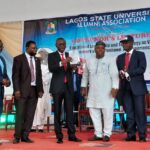By Ezeocha Nzeh
There are fears that the National Assembly proposal of direct primary ftpo be used by political parties in picking their candidates for future elections as contained in the Amended Electoral Bill which has been forwarded to President Muhammadu Buhari’s assent may not see the light of the day as both the presidency and House of Representatives has sought the position of the Independent National Electoral Commission (INEC) before president Buhari finally decides on whether to sign the bill or not
The Muhammadu Buhari, who received the bill on November 19 from the national assembly, had last week written a letter to the Chairman, Independent National Electoral Commission (INEC), Prof. Mahmoud Yakubu, seeking the position of the commission over the Electoral Act amendment bill
Also the House of Representatives on Thursday invited the Chairman of the Independent National Electoral Commission (INEC) Prof Yakubu Mahmood to address concerns raised from various quarters about the cost of running direct primaries.
The INEC chairman is expected to appear before the House Committees on INEC and Appropriation on the matter on a yet to be identified date.
This House took the resolution followed the adoption of a motion of urgent importance by Hon Leke Abejide on the need to address concerns over the cost of running direct primaries in the country.
Hon. Abejide argued that it was necessary for the INEC Chairman to address the House to resolve all fears and concerns about the direct primary.
He said: “The INEC Chairman should brief the Committee on INEC and Appropriations because now that we are considering the (2022) appropriation that is still within the National Assembly for possible consideration for whatever it is going to cost for these direct primaries.
“We are all aware of the importance of direct primary and how it will transfer power to the real people, where they will be able to select or elect the people that will represent them from the presidency down to the councillorship. There has been a lot of noise about the cost implications.
“People have been saying that it will gulp N500bn but this is just hearsay. Nobody has ever sat down to check the actual cost that it is going to cost the nation. It may be something that is within the capacity of the budget of INEC or something that we can even appropriate for this period that we are still considering this budget.
So, it is important for us to invite the Chairman of INEC to meet with the Committees on INEC in this hallowed chamber, and that on Appropriations, for him to be able to tell them what is going to cost to do this direct primary.”
The president is expected to act on the bill within 30 days of is receipt, after which the National Assembly can recall it and take a position, if he refuses to sign it into law or communicate to them
INEC source expressed concerns over the insertion of direct primary in the bill, which they commission has described as controversial
It would be recalled that while majority of political watcers in the country have applauded the National Assembly of the direct primary proposal it has however received total rejection by the governors, who have intensified lobbying to ensure that the president does not sign the bill as presented by the National Assembly members
INEC is however expected to advise the president and the House of Representatives on the merits and demerits of the bill and let the President decide.
Reacting to the President’s letter and Reps invitation, INEC National Commissioner and chairman of its Information and Voter Education Committee, Festus Okoye, described it as constitutionally, legally and administratively, adding that the electoral management body is the end user of the electoral legal framework.
He noted that as the president acted in the righ direction to seek the opinion of the commission and other critical agencies in the electoral process before a new legal framework becomes law.
Okoye said, “Pursuant to Section 58(4) of the constitution of the Federal Republic of Nigeria, 1999 (as amended), the President has 30 days to assent to a bill presented to him by the National Assembly.
“The President has requested the commission and other critical national institutions to revert with detailed and considered views indicating whether or not the President should assent to the bill.
“This is the democratic way to go and the commission will make its views known to the President bearing in mind the overriding national interest and interest of our democracy.
“The commission will go through the bill and revert to the President within the time frame given to it.”
He said INEC was aware that Nigerians were waiting for this bill and also conscious of the fact that a comprehensive, clear, unambiguous and forward-looking electoral legal framework was germane to early preparations for elections.
Noting that the regulations and guidelines of the commission are drawn from the Electoral Act, Okoye argued that without a new electoral legal framework, the work of the commission will be tentative and that will not be good for the electoral process.
He however noted that it was rather unfortunate that the issue of direct or indirect primary had overshadowed other fundamental issues in the bill.
“The commission has monitored direct and indirect primaries organised by the different political parties. The commission does not dictate to political parties on the mode of primaries to adopt.
“The new system of direct primary election proposed in the bill domiciles the conditions for the conduct of the primaries with the political parties. In other words, the procedure adopted for the direct primaries shall be spelt out in a guidelines to be issued by the political party and filed with the commission at least 14 days before the primary election.”



